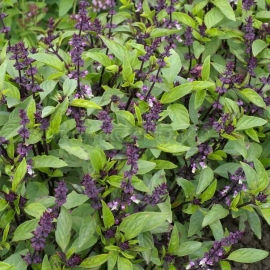


«Clove» - Organic Basil Seeds
1.14 €
Clove basil is a larger than average basil variety, hence the nickname, “Tree basil.” It can reach heights of three meters (or four feet). Its woody stem is dark green to purple, sprouting large elliptical, lime-colored leaves.
-
Organic Basil «Clove»
Clove basil is a larger than average basil variety, hence the nickname, “Tree basil.” It can reach heights of three meters (or four feet). Its woody stem is dark green to purple, sprouting large elliptical, lime-colored leaves with coarsely serrated edges.
Clove basil is very aromatic, the oils in the leaves give off an intense clove aroma with the occasional notes of thyme. Mature plants develop edible, white flowers that have a slightly feathery appearance and are bitter compared to the sweet and spicy leaves.
Clove basil is an aromatic perennial herb that is botanically classified as Ocimum gratissimum with two other synonyms, Ocimum viride, and Ocimum suave. It may also be commonly referred to as African basil, Himalayan basil, Tree basil and East Indian basil. Like its name implies, Clove basil offers a strong clove aroma that has both culinary and everyday household applications.
How to Grow
Basil needs 6 to 8 hours of sun; in the South and Southwest, it benefits from afternoon shade. Set out plants at least 2 weeks after the last frost in spring; summer planting is okay, too. Space at the distance recommended on the label, which is generally 12 to 18 inches apart. Plants are very frost sensitive, so keep plants protected in case of a late cold spell. Basil likes rich, moist, but well-drained soil with a pH of 6 to 7. Because it is harvested continually for lots of leaves, it needs a little fertilizer. When planting, add plenty of organic nutrients from compost, blood meal, or cottonseed meal to the soil.
If planting in a container, use a large pot to keep the plants from drying out quickly in hot weather. You may also want to add mulch around the plants to help keep the soil moist and extend the time between waterings.
